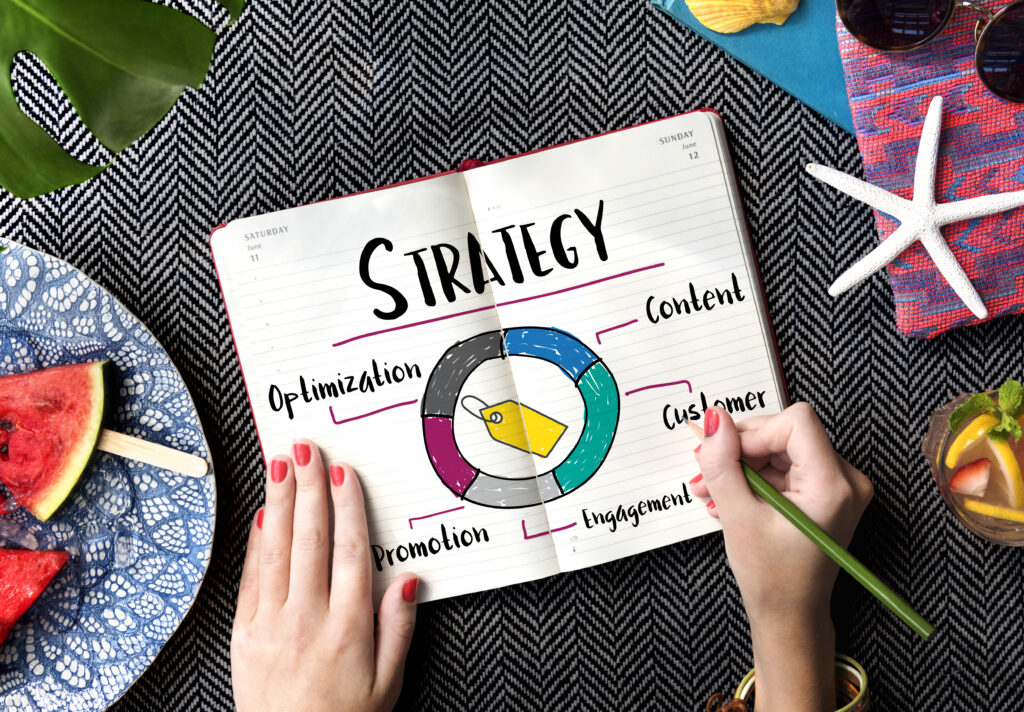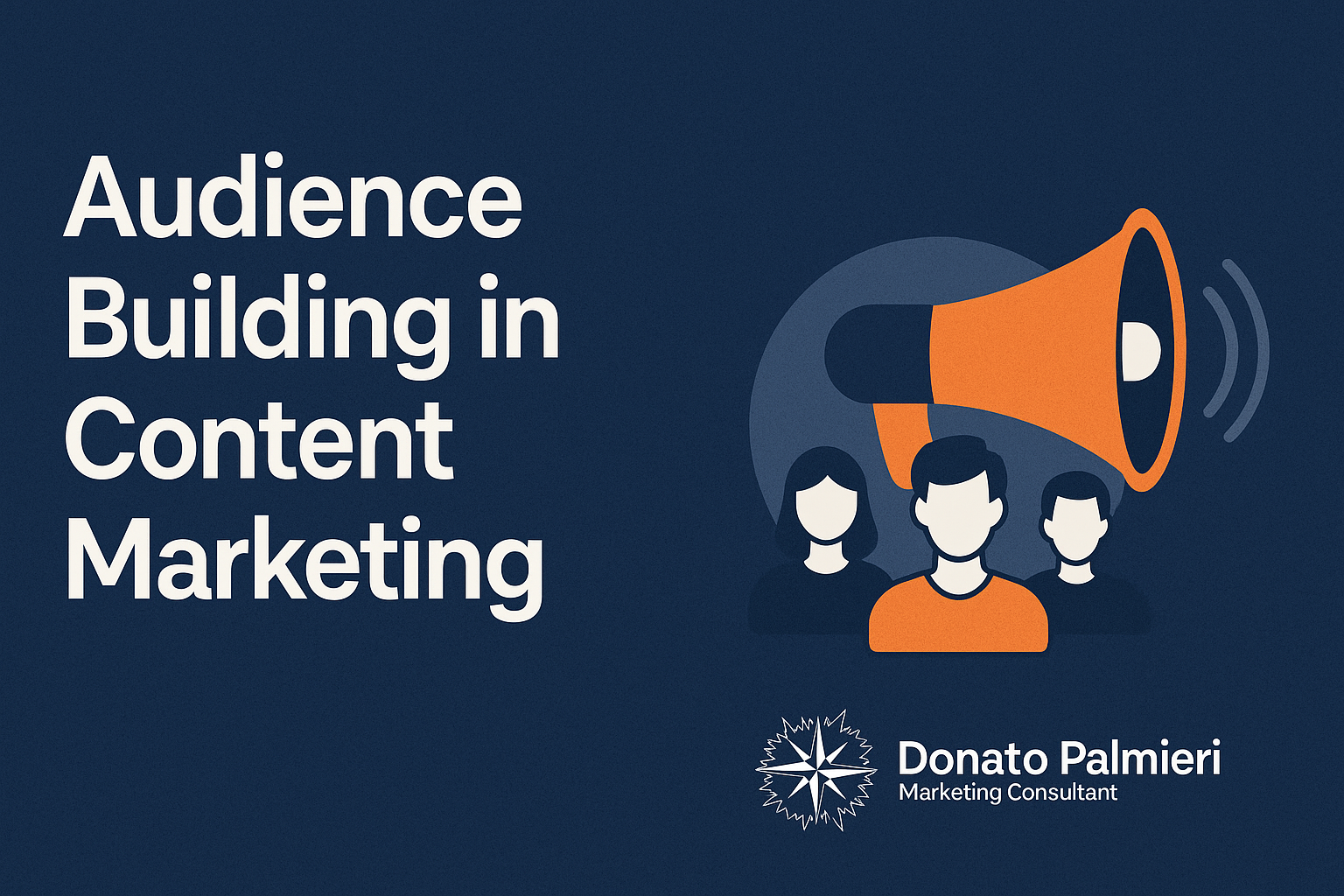Crafting a Content Marketing Plan
In an online world saturated with information, companies face a constant challenge: how to stand out, engage meaningfully, and convert attention into lasting value. The answer, more often than not, lies in a well-executed content marketing plan. But let’s be clear—effective content marketing isn’t about random blog posts or viral videos. It’s about designing a clear, long-term vision that aligns with your brand identity and serves your audience’s needs at every stage of their journey. I’m Donato Palmieri, and I’ve had the privilege of working alongside brands of all sizes to craft content marketing plans that not only attract traffic but build trust, convert leads, and fuel sustainable growth.
In this article, I’m going to share a complete framework that I use with my clients—one that you can adapt for your own business to make content your most powerful marketing asset.

Index:
- From tactic to business engine
- Step 1: Define strategic goals
- Step 2: Understand your audience
- Step 3: Conduct deep research
- Step 4: Choose formats and channels that match your audience
- Step 5: Operationalize your strategy with a content calendar
- Step 6: Publish SEO-friendly content
- Step 7: Promote content strategically
- Step 8: Review performance and evolve
Content marketing: from tactic to business engine
What once was a complementary tactic has now become a core pillar of modern digital marketing. Content marketing is more than storytelling—it’s a data-informed, goal-oriented approach to creating and distributing information that supports the full customer journey. From awareness and education to conversion and loyalty, content plays a role at every touchpoint.
When businesses treat content as a strategic asset rather than a series of isolated efforts, the payoff is significant: better SEO rankings, stronger customer relationships, and consistent inbound growth. A documented content marketing plan acts as the engine behind this success, keeping your efforts aligned, measurable, and scalable.
The right content plan starts with clarity. It defines your objectives, identifies who you’re talking to, and outlines what type of content will move the needle for both your audience and your bottom line.
Step 1: Define strategic goals
Effective content begins with strategic intent. Vague ambitions like “get more visibility” won’t cut it. Instead, your content marketing goals should be directly tied to broader business outcomes, such as brand growth, customer acquisition, or revenue uplift. When I work with clients, one of the first exercises we do is align their content strategy with their digital marketing plan to ensure that content supports the bigger picture.

Some concrete examples include:
- Growing organic search traffic for mid-funnel keywords
- Increasing demo or contact form submissions through educational content
- Building authority in a niche via long-form content and thought leadership
Let’s say your objective is to build awareness among decision-makers in the B2B space. A possible goal might be: “Increase inbound traffic from non-branded keywords relevant to B2B lead generation by 25% within the next 90 days.” That’s specific, measurable, and integrated with SEO and business development.
| Objective | Success Metric | Timeline | Channels |
|---|---|---|---|
| Grow organic search traffic | +25% organic sessions | 3 months | Blog, search engines |
| Capture qualified leads | 150 new form submissions | 6 months | Website, LinkedIn Ads |
| Build brand authority | Backlinks and mentions | Ongoing | Guest posts, interviews |
Step 2: Understand your audience
One of the most common pitfalls in content marketing is creating content based on assumptions rather than data. To make your content relevant and engaging, you need to understand your audience beyond surface demographics. Who are they? What problems are they trying to solve? Where do they go for answers? Which content formats do they trust?
As a digital consultant, I always recommend developing data-backed personas, using analytics tools, CRM data, and direct conversations. Buyer personas should reflect your ideal customers’ needs, behaviors, and decision-making patterns. This approach is key to aligning your message with their intent and delivering meaningful value.

You might identify one persona as a marketing manager looking for ways to scale SEO, and another as a founder seeking guidance on digital strategy. Each will require different tones, formats, and depth.
Incorporating this level of segmentation ensures that content resonates at every touchpoint and increases the likelihood of engagement and conversion.
Step 3: Conduct deep research
Topic ideation is where most content strategies fall short. The best way to avoid wasting time on low-impact content is through rigorous research. I use a combination of keyword analysis, competitive audits, and user behavior data to build content clusters around high-value opportunities.
Start by mapping out seed keywords that match your core services. Then use SEO tools like Ahrefs or SEMrush to uncover related terms, long-tail variations, and questions users are asking. Next, perform a content gap analysis: identify what your competitors are covering well—and where they’re falling short. This reveals areas where your brand can step in and offer unique value.
You’ll also want to analyze internal data—such as search queries on your site, support tickets, or sales team insights—to identify recurring customer pain points that content can address.
By grouping your content into clusters (e.g., a pillar article about “building a content strategy” with related posts about formats, SEO, and analytics), you enhance your topical authority and improve interlinking, a core component of successful SEO strategy.
Step 4: Choose formats and channels that match your audience
Content needs to be more than informative—it needs to be delivered in the format and on the channel where your audience already consumes information. A visual learner might prefer an infographic, while a decision-maker might gravitate toward a podcast.

Based on your personas, determine which formats (e.g., blog posts, webinars, whitepapers, short-form videos) will most effectively convey your message. Then, match each format with its most suitable platform. For example, instructional videos perform well on YouTube and Instagram Reels, while long-form case studies are ideal for your blog and newsletter.
| Content Format | Best Use Case | Primary Channel |
| Blog Post | Evergreen SEO and thought leadership | Website |
| Webinar | Live engagement and lead capture | Zoom, YouTube |
| Infographic | Data visualization and summaries | LinkedIn, Pinterest |
| Newsletter | Nurture and retention | |
| Video Shorts | Quick education, brand storytelling | Instagram, TikTok |
Ensure that each piece fits cohesively into your broader strategy structure and supports one or more business goals.
Step 5: Operationalize your strategy with a content calendar
Without clear timelines and accountability, even the most brilliant strategy will flounder. A well-structured editorial calendar brings your plan to life and ensures consistency in execution.
Your calendar should include:
- Title and topic angle
- Target persona and funnel stage
- Keyword focus and SEO elements
- Draft and publish dates
- Distribution channels and post-publish promotion
I recommend planning content at least one quarter ahead while leaving room for topical or seasonal pivots. Use project management tools like Trello, Asana, or Notion to assign tasks, track progress, and integrate feedback cycles.
Step 6: Publish SEO-friendly content
Publishing is a strategic step—not the finish line. Every article or asset should be optimized with search and conversion in mind. This means using primary and secondary keywords, structuring content with headers, and including compelling CTAs.
Don’t forget internal linking. Connect new posts to foundational content like your content marketing planc or relevant guides on social media tactics. This not only improves SEO but encourages readers to explore more of your expertise.
Each piece should also reflect your brand tone, solve a specific problem, and guide the user to the next step—whether that’s downloading a resource or booking a consultation.
Step 7: Promote content strategically
If a post goes live and no one sees it, does it matter? Content promotion is as important as content creation. Make promotion part of your workflow from the beginning. I advise clients to build multichannel promotion plans into their content calendar.

Tactics to include:
- Organic sharing across your personal and business social channels
- Cross-promotion via email newsletters and blog updates
- Influencer or partner collaborations for extended reach
- Paid campaigns on Google or LinkedIn for key assets
Repurpose high-performing pieces across formats. For instance, turn a blog post into a carousel, then into a newsletter series, then a short video. This multiplies your exposure without multiplying your workload.
Step 8: Review performance and evolve
No content plan is ever “done.” Measurement is critical—not only to prove ROI, but to learn what resonates and what doesn’t. Use tools like GA4, HubSpot, or Search Console to track performance.
Focus on key metrics:
- Engagement time and scroll depth
- Organic impressions and click-through rate (CTR)
- Conversion paths and assisted revenue
- Inbound links and shareability
Set monthly and quarterly review points. Adjust strategy based on insights. Retire content that underperforms, refresh articles that are declining, and double down on formats and topics that drive results.
A long term strategy
Creating a content marketing strategy is not about chasing trends. It’s about building an intentional, sustainable system for earning attention and trust. With the right structure, content becomes a lever for growth across every part of your business.
If you’re ready to treat content as a strategic asset and want guidance tailored to your specific goals, visit the website or learn how I can help through my tailored services page. Let’s make your content your most valuable business investment.


